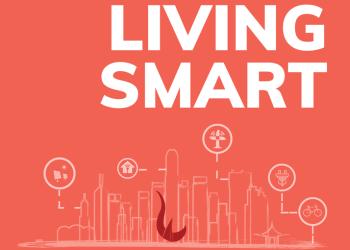新聞及香港科大故事
2020
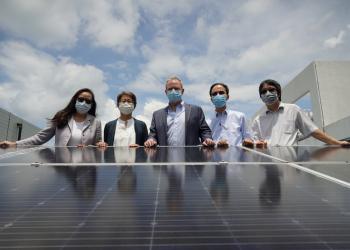
新聞
科大安裝全港最大型太陽能發電系統
香港科技大學(科大)一直致力成為可持續發展先驅,今日宣佈將於校內逾50個地點建設一個達8,000塊太陽能板的可再生能源項目,完工後將為本港最大規模的同類型發電系統。
科大會於校園內超過50個地點安裝8,000塊太陽能板
這個系統將於未來25年間,每年產生300萬度(千瓦時)電,相當於香港900戶三人家庭一年的用電量1 ,並減少約150萬公斤碳排放。透過參與中電的可再生能源上網電價計劃 (FiT)2 ,項目從今起至計劃於2033年終結為止,將帶來高達1億6000萬港元的上網電價收入; 扣除安裝太陽能電板的成本,科大每年平均收入為400萬,收益將投放至大學其他節能減排的措施上。此外,科大亦會劃出部分太陽能板作實驗用途,讓科大成員測試與太陽能板相關的意念及研究項目。發電系統第一階段工程,已於本年七月展開並將持續至2021年。 此發電系統為「科大2020 可持續發展挑戰」藍圖的項目之一,為響應鼓勵社區安裝分佈式可再生能源裝置而推出的FiT計劃,大學將於校園內安裝數以千計、優質及高效能的單晶硅太陽能板,當中包括傳統及具彈性的纖薄光伏板。藍圖於2016年訂立,為減少能源消耗、溫室氣體排放和廢物量等目標而制定了一系列措施及方案。

新聞
科大推出香港首個電子證書認證平台
香港科技大學(科大)近日推出科大「區塊鏈證書」平台,為畢業證書、學業成績單等認證提供了一個方便、安全可信的系統,有助打擊偽造證書,並籍此推廣無紙化與可持續發展校園。 現時,畢業生每需要一份紙本畢業證書,均需向大學提出要求並付款,既不環保又費時,為畢業生與雇主雙方帶來麻煩。作為香港首間大學推出以區塊鏈技術為基礎的學位認證系統,科大希望帶領潮流,逐步取代傳統的列印本證書,並期望此認證平台能有助遏止偽造學歷等非法活動。 科大畢業生將於本月底開始收到校方經電郵發送、獲加密簽署及具防篡改功能的電子畢業證書。大學亦會於本年11月向畢業生提供電子學業成績單﹔有需要提前取得電子成績單的學生也可自9月份起向校方提出個別申請。大學已向多個雇主推廣此新措施,當中包括國際背景調查機構首優諮詢、綜合電訊及科技方案供應商香港寬頻,以及稅務及審計顧問羅兵咸永道。業界對此新技術態度正面並予以支持。
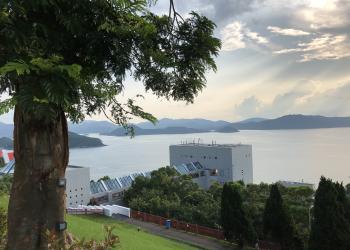
新聞
通向可持續樹木管理之路
「每棵樹都是活著的生命!」土木及環境工程學系教授暨副系主任王幼行教授一邊欣賞科大海旁附近山坡的一棵大樹,一邊有感而發。2018年9月, 颱風「山竹」襲港,將這棵樹幾乎吹斷一半。王教授最初心想大樹受此重創,也許「難逃一刧」,但它卻如奇蹟般存活下來;樹木應對惡劣天氣的韌力和復原能力,的確叫他驚喜不已! 事實上,隨著氣候轉變,極端天氣越趨頻密。為了監測這棵樹的穩定性,王教授在樹幹底部裝設了智能感應器,以便監察其傾斜角度。
這個安裝在樹上的感應器,是由以王教授為首的研究團隊研發,而且源自七年前一項由學生主導、運用遙感技術探測斜坡穩定性的專題研習項目。
土木工程研究生陳斌祥是王教授團隊的成員。他說:「身為工程師,我們要尋找一個可以準確評定樹木健康狀況的方法。透過研究一棵樹的物理數據,可以準確評估樹幹傾斜是否不可逆轉,並於必要時立即進行補救。」
2017年,香港特區政府主動接觸研究團隊,探討將遙感技術用於監測樹木的可行性。當時,市場上的傳統感應器無法符合樹木感應器的兩大基本要求:第一、數據傳輸不會受極端天氣干擾;第二、省電耐用。
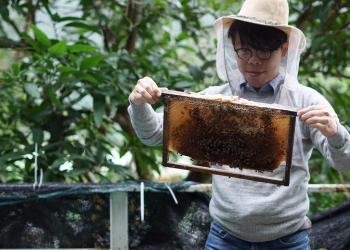
新聞
應對全球危機的甜蜜方案
佘焯成是2011年的數學理學士畢業生,一路走著順遂且豐富多彩的人生旅程。畢業短短數年,他用兩年時間苦心經營的數學補習社,已讓他嚐得創業成功的滋味。
身為數學科補習名師,數學讓佘焯成名利雙收,但沉重的工作壓力亦令其健康在2017年響起警號,意外地改寫了他的人生。
他憶述:「我當時受腸胃問題困擾,朋友建議我服用天然原蜜調理身體,效果很好,立時引起我對蜜糖和蜜蜂的興趣,自此不停研究,我的人生亦因此改變。」
焯成向元朗一位本地蜂農拜師,學習怎樣在不用抗生素、不加糖、不熱壓的情況下生產蜂蜜,愈是鑽研,興趣愈濃,2017年更與兩位科大校友合作創辦自己的第二盤生意「香港原蜜」。自此,他不僅積極宣揚原蜜對健康的好處,更致力保育蜜蜂,以協助全球生態系統保持平衡。
近十年來的絶大部份時間,很多蜂農都表示每年失去三成或以上的蜂巢。全球蜜蜂數量銳減,嚴重威脅各式各樣人類賴以生存的植物及穀物,情況令人憂慮。
他說:「這是我投身養蜂業的其中一個重要原因。全球暖化和使用殺蟲劑,導致蜜蜂數量急跌,但不少植物倚賴蜜蜂授粉,人類約有七成食糧是由蜜蜂支援生產。」
在人口稠密的城市,無休止的發展令野生蜜蜂及其食物供應飽受威脅,加上熱帶風暴的破壞力有增無減,即使業界努力補救,蜂蜜供應依然不甚穩定。
解決問題的其中一個有效辦法,就是大量在城市養殖獨居蜂。焯成說,獨居蜂佔了全球蜜蜂的九成,生性溫馴,無需倚靠蜂巢存活,因此是家居養蜂的首選。用木頭和其他物料搭建小小的蜂箱,已可為獨居蜂提供基地。這些蜂箱可放置在家居或公園任何角落,在自然環境中增添蜜蜂授粉的機會。
在城市設置「蜜蜂酒店」的做法在全球越見普遍。他說:「這在台灣非常盛行,甚至深入學校,但香港仍需努力推廣。」
科大對促成佘焯成的「甜蜜」人生居功不少。他攻讀數學學位時,副修生態研究及中國研究,對全球暖化有一定認識,明白氣候變化如何影響地球。他亦熱衷與別人分享其所學知識。
現時,焯成既要打理補習社,又忙於在大嶼山和大帽山郊野公園附近建立生產基地、舉辦蜂場生態教育團向參觀者講解香港常見的花蜜植物、蜜蜂生活習性、採收蜜糖方法,以及設置蜜蜂酒店。
2019
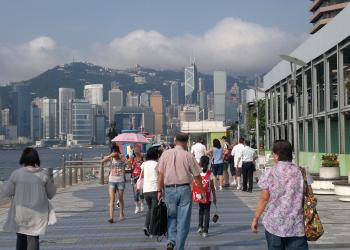
新聞
HK Set for Worst of It Amid Climate Change (只提供英文版本)
This month, we experienced the hottest day of the year as temperatures in Hong Kong reached 35.1 degrees Celsius.
Countries across western Europe also struggled in record-breaking temperatures recently, with France hit the worst at 45.9 degrees in June.
The grim situation appears to have been a repeat of last year's conditions.
Although there are ongoing indepth analyses and further studies to examine the causes of individual extreme temperature events, many experts believe that extreme heat waves would not be feasible without anthropogenic climate change, meaning human activities are the main culprit for global warming ravages.
Such an assumption has been proven by climate models - a complex computer simulation of physical processes and mathematical formulae used mainly to predict climate and understand how the climate system responds to elevated greenhouse gas emissions.
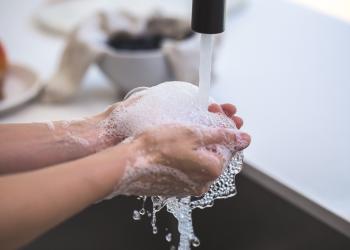
新聞
Germaphobia Doesn't Wash Healthwise (只提供英文版本)
A recent Consumer Council survey has found that only two out of eight tested anti-bacterial handwash products can live up to their claims of having 99.9 percent efficacy in killing germs, sparking worries amongst the public.
Advertisements often imply that bacteria in homes are harmful and must be eliminated by using any antibacterial or antimicrobial products available.
However, Boston University's School of Public Health suggests only about 5 percent of bacterial species are disease-causing, in other words pathogenic.
In fact, the pursuit of a germ-free environment is futile.
Some bacteria are just impossible to eliminate with chemicals in the cleansing agents, or at the concentrations level of the chemicals we are commonly using.
Even the so-called 99.9 percent efficacy must rely on perfect usage of the product.

新聞
Let's Make A Start Toward Cleaner Society (只提供英文版本)
The recent Extinction Rebellion movement in the UK protested against climate breakdown, biodiversity loss and the risk of social and ecological collapse.
Protesters called for policies that can achieve a net zero carbon footprint by 2025, one of the 17 sustainable development goals agreed by world leaders at the United Nations in 2015.
Meeting these goals requires more than addressing climate change.
Sustainable development is a balance between the needs of the environment, society and economy in order to maintain a quality standard of life for both present and future generations.
Many countries, including the UK, have implemented goal-specific measures in a bid to achieve the 17 goals, with voluntary national reviews to see if the measures are effective.









